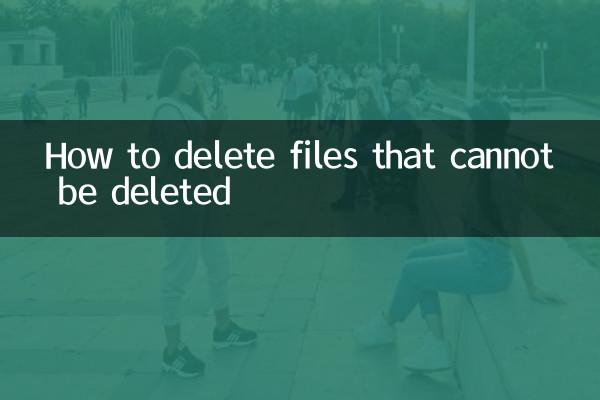How to delete files that cannot be deleted
During the daily use of computers, we often encounter some files that cannot be deleted, which may be occupied by the system, insufficient permissions or damaged. This article will provide you with popular solutions for the entire network for nearly 10 days and present them in the form of structured data to help you completely solve this problem.
1. Common reasons why files cannot be deleted

| reason | describe |
|---|---|
| Files are occupied | The file is being used by a program or system process |
| Insufficient permissions | The current user does not have permission to delete the file |
| File corruption | File system errors can not be deleted normally |
| Virus or malware | Virus protects files from deletion |
2. Complete solution
Here are the most effective solutions organized by the entire network:
| method | Operation steps | Applicable scenarios |
|---|---|---|
| Restart the computer | 1. Close all programs 2. Restart the computer 3. Try to delete the file | Files are occupied |
| Using Task Manager | 1. Open Task Manager 2. End the relevant process 3. Delete the file | Know which program occupies the file |
| Change file permissions | 1. Right-click the file → Properties → Security 2. Edit permissions 3. Grant full control | Insufficient permissions |
| Use the command line | 1. Run cmd as administrator 2. Enter "del /f file name" | Stubborn files |
| Using third-party tools | 1. Download Unlocker and other tools 2. Right-click the file and select Unlock and delete | All Situations |
3. Advanced skills
For particularly stubborn files, try the following:
1.Safe Mode Delete: Restart and enter safe mode. At this time, the system loads the least programs, making it easier to delete occupied files.
2.Using PE system: Start the PE system through the USB drive and bypass the file protection mechanism of the original system.
3.Disk Check: Run the chkdsk command to fix disk errors, which may solve the deletion problem caused by file system errors.
4. Preventive measures
| measure | illustrate |
|---|---|
| Regular cleaning | Avoid stacking of useless files |
| Using regular software | Reduce the chance of file corruption |
| Install antivirus software | Prevent viruses from creating undeletable files |
| Pay attention to permission management | Set file permissions reasonably |
5. Things to note
1. Deleting important system files may cause system crash. Please confirm the nature of the file before operating.
2. If the working file cannot be deleted, it is recommended to back up first and then try to delete it.
3. When using third-party tools, please download them from the official website to avoid malware.
Through the above methods, I believe you can definitely solve those "stubborn" documents. If the problem persists, it may be that there is physical damage to the disk, it is recommended to contact a professional for inspection.
Finally, please think twice before deleting files to avoid accidentally deleting important data. It is recommended to back up important files regularly to cloud storage or external hard drives in case of accidents.

check the details

check the details